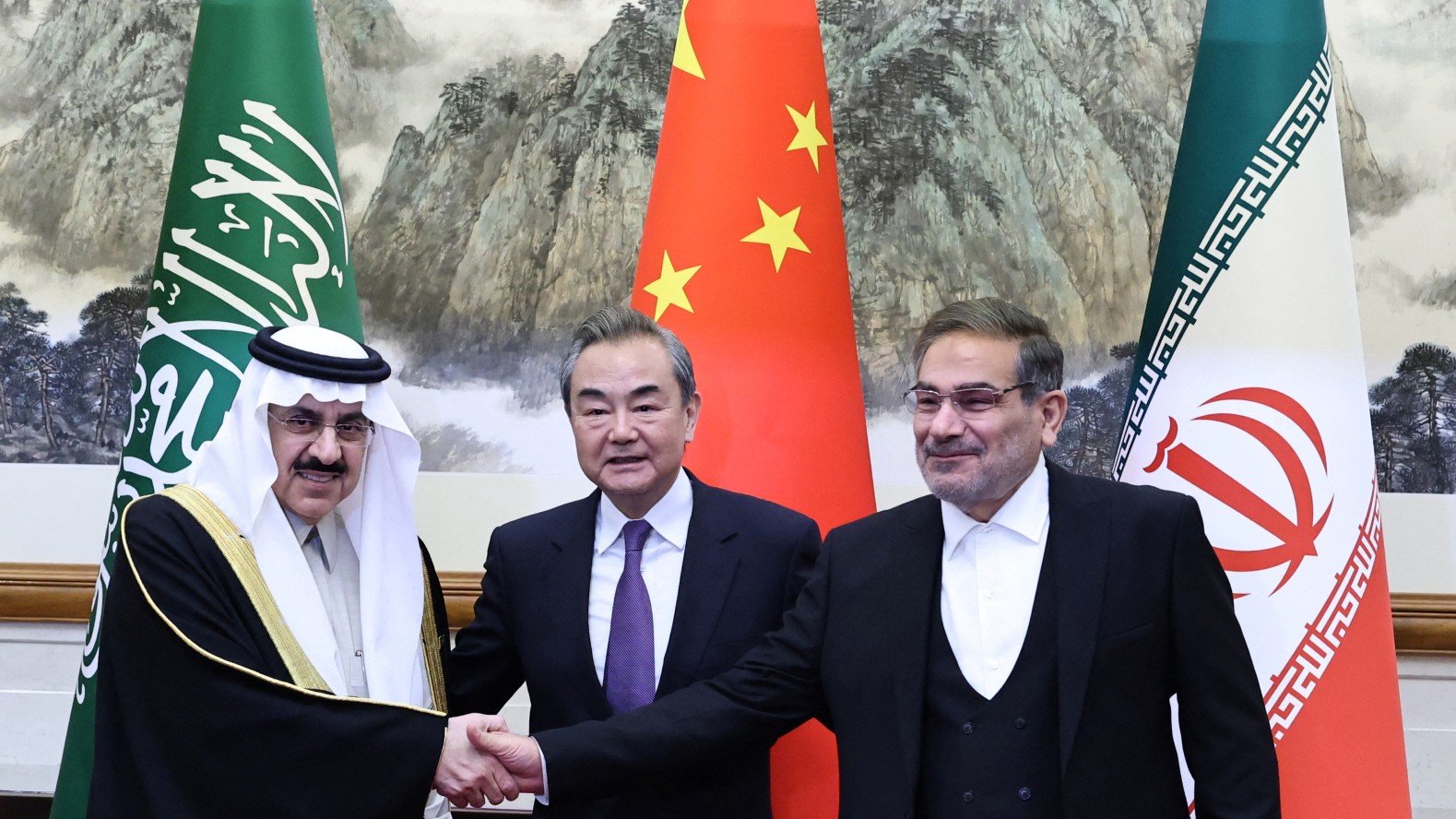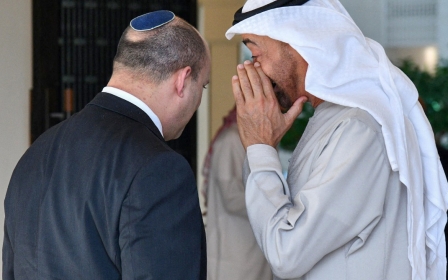Saudi-Iran reconciliation: Is Arab-Israeli alliance against Tehran ending?

Israel’s regional policy has long been based on hegemony, superiority and arrogance. Leaders Shimon Peres and Benjamin Netanyahu often repeated the notion of an alliance based on “Israeli brains and Arab money”, while also promoting the concept of protecting Arab regimes with Israeli intelligence technologies and strategies for economic peace.
The aim was always twofold: to achieve normalisation and bolster Israel’s regional influence, and to accelerate the disappearance of the Palestinian cause.
Arab national interests require a careful reconsideration of Israel's position in the regional equation, and a curtailment of its influence
For Israel, Iran presented an opportunity to ally with Arab states on both an economic-security basis and a strategic basis, with regards to confronting their “mutual enemy”. In this way, Israel has sought a multilateral strategy: a regional alliance under the auspices of the US, seeking to declare war on Iran and overthrow the regime.
But as the Arab Gulf alliance in the Yemen war has eroded, Israel’s attempts to court an Arab ally that would wage war on Iran have been met with failure. Israel has made no secret of its wish for Saudi Crown Prince Mohammed bin Salman, whom it considers a likely future ally, to replace his aging father King Salman. But contrary to Israel’s wishes, a number of Gulf states - including Kuwait and the UAE, followed this month by Saudi Arabia - have been reopening diplomatic, economic and security channels with Tehran.
Viewing the overthrow of Iran’s Islamic regime to be a priority, the Israeli government in January appointed Major General Eyal Zamir, who has expertise in Iranian affairs, as director general of the security ministry.
Stay informed with MEE's newsletters
Sign up to get the latest alerts, insights and analysis, starting with Turkey Unpacked
Gulf and regional power balances, however, are too strong to be determined by Israel and its desires or arrogant theories.
Lack of allies
Since the launch of the Russia-Ukraine war and its ensuing impacts on the global economy, Gulf countries - especially major oil exporters - have opted not to bet on the American position, declining to take part in sanctions against Russia. Instead, they have strengthened their cooperation with Moscow to maintain oil prices, while enhancing their massive trade and economic relations with China. These are higher vital interests that Israel cannot circumvent, no matter how hard it tries.
For Israel, the agreement between Iran and Saudi Arabia to normalise ties under the auspices of the Chinese government will come at a strategic price, with regional and international dimensions. It limits Israel’s regional influence and eliminates the notion of an Arab-Israeli alliance against Iran.
While Israel has sought to strengthen ties with countries such as Italy, Germany, the United Kingdom, and France in an effort to build an international and regional anti-Iran axis, it knows that international players are not convinced such a project could work without decisive American force.
Moreover, disruptions to oil, gas and grain exports resulting from the Ukraine war would hamstring Europe from carrying out any military actions that could exacerbate the energy crisis. It was thus not surprising that the European Union quickly welcomed the Saudi-Iran deal, viewing it as vital to regional stability and conflict resolution.
At the same time, the Saudi-Iran deal could put an end to Israel’s nuclear monopoly, opening the door for other countries in the region to acquire nuclear capabilities. According to American media, Saudi Arabia is seeking Washington’s approval to develop a civilian nuclear programme as part of its price for potentially normalising relations with Israel. Other countries in the Levant and North Africa, such as Egypt, may look to do the same.
This would degrade the effectiveness of Israel’s most important deterrent force in the long term, threatening its regional influence and potentially limiting the overall effectiveness of the Abraham Accords.
Delicate balance
The possibility that the Saudi-Iran agreement might lead to forging diplomatic relations between Saudi Arabia and Israel cannot be ruled out. But the future context for such deals will be different, given that Israel is no longer viewed as a security umbrella to protect the Gulf, nor is it a substitute for the US. In the regional equation that is currently being shaped, Israel is neither crucial nor a security necessity.
Under Riyadh’s new vision, Saudi Arabia is seeking a leading role for itself at both the regional and international levels, driven by its economic power and influence. It is capable of negotiating the delicate balance of a world shifting from unipolarity to pluralism.
The Gulf countries, as emerging economies, are being proactive in identifying and analysing the features of the international system’s transitional phase. They are trying to position themselves in ways that can protect and preserve their interests, while other actors are fighting over influence and hegemony.
At the same time, Israel fears that the Beijing agreement could pave the way for a resolution to the war in Yemen. This conflict has presented a great opportunity for Israel to increase its influence in the Red Sea and the Arabian Sea, and the deal risks hindering its efforts to establish a military foothold in the region.
Another concern for Israel is a potential new Taif agreement in Lebanon, whose two parties would be Saudi Arabia and Iran, guaranteeing the stability of the Lebanese regime and economy. Lebanon’s collapse has always been in Israel’s interests.
Indeed, Israel’s international crisis is today so deep that it has spurred back-and-forth accusations between the Netanyahu government and its predecessor regime, that of Yair Lapid and Naftali Bennett, over who bears the responsibility for this strategic failure.
Changing strategies
The restoration of Saudi-Iranian ties, which were cut in 2016, is yet more proof that the notion “the road to Washington passes through Tel Aviv” no longer applies. A strategy founded upon the approval of Washington and Tel Aviv cannot preserve the security and stability of the region, but rather risks undermining them.
Indeed, to guarantee the success of the Beijing agreement and to build on it, Arab leaders need to re-examine their strategies towards influential powers, both regionally and internationally. Arab national interests require a careful reconsideration of Israel’s position in the regional equation, and a curtailment of its influence.
For Palestinians, on the other hand, the Saudi-Iran agreement constitutes an opportunity, opening up new horizons in their struggle to obtain their legitimate rights.
As the extremists leading Israel today face a major crisis, the ongoing changes to the structure of the international system require the active participation of regional Arab states, which can work to establish new mechanisms to block Israeli expansionism, extremism and racism.
The views expressed in this article belong to the author and do not necessarily reflect the editorial policy of Middle East Eye.
A longer version of this article was first published on the Centre for Arab Progress website.
Middle East Eye delivers independent and unrivalled coverage and analysis of the Middle East, North Africa and beyond. To learn more about republishing this content and the associated fees, please fill out this form. More about MEE can be found here.







